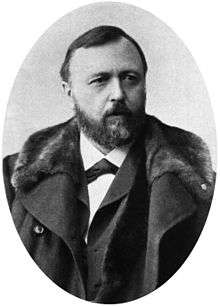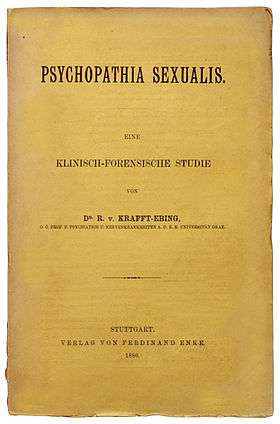Richard von Krafft-Ebing
Richard Freiherr von Krafft-Ebing[1] (1840–1902; full name Richard Fridolin Joseph Freiherr Krafft von Festenberg auf Frohnberg, genannt von Ebing) was an Austro–German psychiatrist and author of the foundational work Psychopathia Sexualis (1886).
Richard Freiherr von Krafft-Ebing | |
|---|---|
 | |
| Born | 14 August 1840 |
| Died | 22 December 1902 (aged 62) |
| Nationality | German–Austrian |
| Alma mater | University of Heidelberg |
| Known for | Psychopathia Sexualis |
| Scientific career | |
| Fields | Psychiatry |
Life
Krafft-Ebing was born in 1840 in Mannheim, Germany, studied medicine at the University of Heidelberg, where he specialized in psychiatry. He later practiced in psychiatric asylums. After leaving his work in asylums, he pursued a career in psychiatry, forensics, and hypnosis.
He died in Graz in 1902. He was recognized as an authority on deviant sexual behavior and its medicolegal aspects.[2]
Principal work

Krafft-Ebing's principal work is Psychopathia Sexualis: eine Klinisch-Forensische Studie (Sexual Psychopathy: A Clinical-Forensic Study), which was first published in 1886 and expanded in subsequent editions. The last edition from the hand of the author (the twelfth) contained a total of 238 case histories of human sexual behaviour.[3]
Translations of various editions of this book introduced to English such terms as "sadist" (derived from the brutal sexual practices depicted in the novels of the Marquis de Sade),[4] "masochist", (derived from the name of Leopold von Sacher-Masoch),[5] "homosexuality",[6] "necrophilia",[7] and "anilingus".[8][9]
Psychopathia Sexualis is a forensic reference book for psychiatrists, physicians, and judges. Written in an academic style, its introduction noted that, to discourage lay readers, the author had deliberately chosen a scientific term for the title of the book and that he had written parts of it in Latin for the same purpose.
Psychopathia Sexualis was one of the first books about sexual practices that studied homosexuality/bisexuality. It proposed consideration of the mental state of sex criminals in legal judgements of their crimes. During its time, it became the leading medico–legal textual authority on sexual pathology.
The twelfth and final edition of Psychopathia Sexualis presented four categories of what Krafft-Ebing called "cerebral neuroses":
- paradoxia, sexual excitement occurring independently of the period of the physiological processes in the generative organs
- anaesthesia, absence of sexual instinct
- hyperaesthesia, increased desire, satyriasis
- paraesthesia, perversion of the sexual instinct, i.e., excitability of the sexual functions to inadequate stimuli
The term "hetero-sexual" is used, but not in chapter or section headings. The term "bi-sexuality" appears twice in the 7th edition, and more frequently in the 12th.
There is no mention of sexual activity with children in Chapter III, General Pathology, where the "cerebral neuroses" (including sexuality the paraesthesias) are covered. Various sexual acts with children are mentioned in Chapter IV, Special Pathology, but always in the context of specific mental disorders, such as dementia, epilepsy, and paranoia, never as resulting from its own disorder. However, Chapter V on sexual crimes has a section on sexual crimes with children. This section is brief in the 7th edition, but is expanded in the 12th to cover Non-Psychopathological Cases and Psychopathological Cases, in which latter subsection the term paedophilia erotica is used.
Krafft-Ebing considered procreation the purpose of sexual desire and that any form of recreational sex was a perversion of the sex drive. "With opportunity for the natural satisfaction of the sexual instinct, every expression of it that does not correspond with the purpose of nature—i.e., propagation,—must be regarded as perverse."[10] Hence, he concluded that homosexuals suffered a degree of sexual perversion because homosexual practices could not result in procreation. In some cases, homosexual libido was classified as a moral vice induced by the early practice of masturbation.[11] Krafft-Ebing proposed a theory of homosexuality as biologically anomalous and originating in the embryonic and fetal stages of gestation, which evolved into a "sexual inversion" of the brain. In 1901, in an article in the Jahrbuch für sexuelle Zwischenstufen (Yearbook for Intermediate Sexual Types), he changed the biological term from anomaly to differentiation.
Although the primary focus is on sexual behavior in men, there are sections on Sadism in Woman, Masochism in Woman, and Lesbian Love. Several of the cases of sexual activity with children were committed by women.
Krafft-Ebing’s conclusions about homosexuality are now largely forgotten, partly because Sigmund Freud’s theories were more interesting to physicians (who considered homosexuality to be a psychological problem) and partly because he incurred the enmity of the Austrian Catholic Church when he psychologically associated martyrdom (a desire for sanctity) with hysteria and masochism.[12]
Works
A bibliography of von Krafft-Ebing's writings can be found in A. Kreuter, Deutschsprachige Neurologen und Psychiater, München 1996, Band 2, pp. 767-774.
- Die Melancholie: Eine klinische Studie (1874) OCLC 180728044
- Grundzüge der Kriminalpsychologie für Juristen (second edition, 1882) OCLC 27460358
- Psychopathia Sexualis: eine Klinisch-Forensische Studie (first edition, 1886)
- Die progressive allgemeine Paralyse (1894) OCLC 65980497
- Nervosität und neurasthenische Zustände (1895) OCLC 9633149
Translations
- Domino Falls translated and edited Psychopathia Sexualis:The Case Histories (1997) ISBN 978-0-9820464-7-0
- Charles Gilbert Chaddock translated four of Krafft-Ebing's books into English:
- An Experimental Study in the Domain of Hypnotism (New York and London, 1889)
- Psychosis Menstrualis (1902)
- Psychopathia Sexualis (twelfth edition, 1903)
- Text Book of Insanity (1905)
See also
References
- Crystal, David. The Cambridge Biographical Dictionary. Cambridge: Cambridge University Press. p. 536. ISBN 0-521-43421-1.
- "Krafft-Ebing, Richard Von". The Columbia Encyclopedia (6th ed.). Columbia University Press. 2018. Retrieved 19 July 2018 – via Questia.

- Jens De Vleminck (2017). "Sadism and Masochism on the Procrustean Bed of Hysteria: From Psychopathia Sexualis to Three Essays on the Theory of Sexuality". Psychoanalysis and History. 19 (3): 381. doi:10.3366/pah.2017.0232. hdl:1854/LU-6984879 – via Edinburgh University Press.(subscription required)
- "sadist". Oxford English Dictionary (3rd ed.). Oxford University Press. September 2005. Retrieved 16 July 2018. (Subscription or UK public library membership required.)
- "masochist". Oxford English Dictionary (3rd ed.). Oxford University Press. September 2005. Retrieved 16 July 2018. (Subscription or UK public library membership required.)
- "homosexuality". Oxford English Dictionary (3rd ed.). Oxford University Press. September 2005. Retrieved 16 July 2018. (Subscription or UK public library membership required.)
- "necrophilia". Oxford English Dictionary (3rd ed.). Oxford University Press. September 2005. Retrieved 16 July 2018. (Subscription or UK public library membership required.)
- "anilingus". Oxford English Dictionary (3rd ed.). Oxford University Press. September 2005. Retrieved 16 July 2018. (Subscription or UK public library membership required.)
- Mark Forsyth. The etymologicon // Icon Books Ltd 2011, page 49.
- Psychopathia Sexualis, 7th ed. translation, pg 56, 12th ed. translation, pg 79
- Psychopathia Sexualis, pp. 185–192.
- Freud, 1915.
Notes
- Johnson, J (1973), "Psychopathia Sexualis.", The Manchester Medical Gazette (published Dec 1973), 53 (2), pp. 32–4, PMID 4596802
- Kupferschmidt, H (1987), "Richard von Krafft-Ebing's "Psychopathia sexualis". Pornography or professional literature?", Schweiz. Rundsch. Med. Prax. (published May 12, 1987), 76 (20), pp. 563–9, PMID 3306869
- Unknown author (2001), "Richard Freiherr von Krafft-Ebing (1840–1903); comments on the cover portrait", Der Nervenarzt (published Sep 2001), 72 (9), p. 742, doi:10.1007/s001150170056, PMID 11599501
- Rosario, Vernon A (2002), "Science and sexual identity: an essay review.", Journal of the History of Medicine and Allied Sciences (published Jan 2002), 57 (1), pp. 79–85, doi:10.1093/jhmas/57.1.79, PMID 11892515
- Hertoft, Preben (2002), "Psychotherapeutic treatment of sexual dysfunction—or from sex therapy to marital therapy", Ugeskrift for Læger (published Oct 7, 2002), 164 (41), pp. 4805–8, PMID 12407889
- Kennedy, H (2001), "Research and commentaries on Richard von Krafft-Ebing and Karl Heinrich Ulrichs.", Journal of Homosexuality, 42 (1), pp. 165–78, doi:10.1300/J082v42n01_09, PMID 11991564
- Sigusch, V (2004), "Richard von Krafft-Ebing (1840–1902. In memory of the 100th anniversary of his death", Der Nervenarzt (published Jan 2004), 75 (1), pp. 92–6, doi:10.1007/s00115-003-1512-7, PMID 14722666
Bibliography
- Heinrich Ammerer: Am Anfang war die Perversion. Richard von Krafft-Ebing, Psychiater und Pionier der modernen Sexualkunde. Styria premium 2011 in der Verlagsgruppe Styria GmbH & Co KG, Wien-Graz-Klagenfurt, ISBN 978-3-222-13321-3.
- Psychopathia Sexualis (1886), reprinted by Bloat Books, 1999. ISBN 0-9650324-1-8
- Oosterhuis, Harry. Stepchildren of Nature (2000), University of Chicago Press. ISBN 0-226-63059-5
- Mackenzie. Transgender Nation (1994), Bowling Green State University Popular Press. ISBN 0-87972-596-6
- Jörg Hutter. Richard von Krafft-Ebing, in Homosexualität. Handbuch der Theorie- und Forschungsgeschichte (Editor Rüdiger Lautmann), Campus Verlag, Frankfurt and New York 1993. Pages 48–54. ISBN 3-593-34747-4
- John K. Noyes, The Mastery of Submission. Inventions of Masochism. Ithaca: Cornell University Press 1997. ISBN 0-8014-3345-2
- Krafft-Ebing, Rainer (ED.), Richard Freiherr von Krafft-Ebing, Eine Studienreise durch Südeuropa 1869/70, Leykam Buchverlag, Graz (A) 2000, ISBN 3-7011-7426-1
- Peter Weibel (ED.) Phantom of Desire, Visions of Masochism, Essays and Texts, Neue Galerie Graz am Landesmuseum Joanneum (English supplement), Graz (A) 2003, Pages 36–38. ISBN 3-936298-24-6
- Savoia, Paolo. Sexual Science and Self-Narrative: epistemology and narrative technologies of the self between Krafft-Ebing and Freud, History of the Human Sciences, 23 (5), 2010
External links
| Wikimedia Commons has media related to Richard von Krafft-Ebing. |
| Wikimedia Commons has media related to Richard von Krafft-Ebing. |
- Works by Richard von Krafft-Ebing at Project Gutenberg
- Works by or about Richard von Krafft-Ebing at Internet Archive
- Psychopathia Sexualis, with Especial Reference to the Antipathic Sexual Instinct: A Medico-Forensic Study by Richard Krafft-Ebing, translated by F. J. Rebman, Rebman Company (New York, New York), undated. (translation of 12th German edition)
- Text-book of Insanity, Based on Clinical Observations for Practitioners and Students of Medicine, by Richard Krafft-Ebing, translated by Charles Gilbert Chaddock 1904
- Psychopathia Sexualis with Especial Reference to Contrary Sexual Instinct: A Medico-Legal Study by Richard Krafft-Ebing, translated by Charles Gilbert Chaddock, F.A. Davis Company, 1894 (translation of 7th German edition)